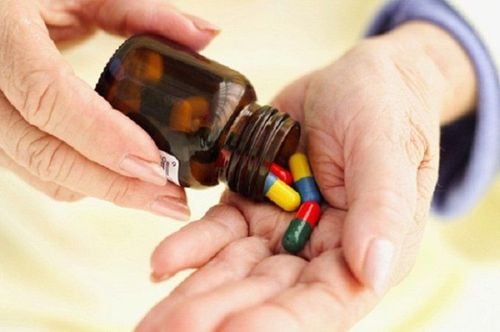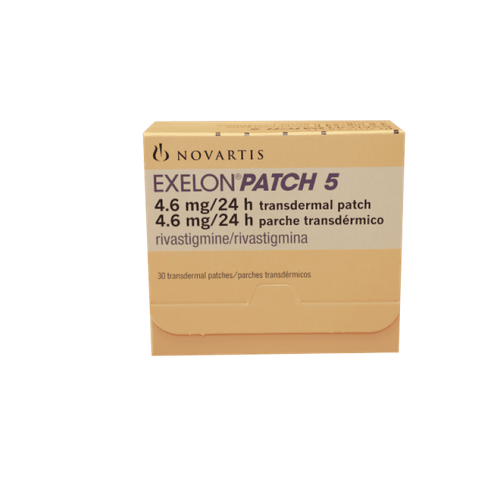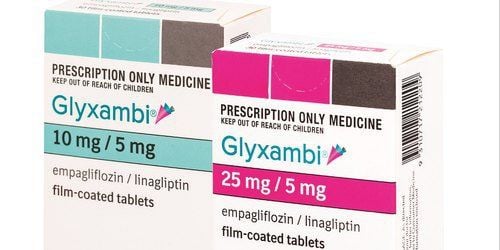This is an automatically translated article.
According to research Alzheimer's disease is a common cause of death in people 65 years of age and older. The disease tends to increase in the following years, knowing about this disease can help you manage and take effective preventive measures.
1. What is Alzheimer's disease?
Alzheimer's disease is a form of progressive memory loss. Dementia is a broader term that refers to conditions that adversely affect memory, thinking, and behavior that interfere with daily living. Alzheimer's disease is the most common cause of dementia. According to the Alzheimer's Association, the disease may account for 60 to 80 percent of dementia cases.
Alzheimer's is a complex disease and scientists are working to better understand it. Most people with Alzheimer's are diagnosed after the age of 65. If diagnosed before age 65, it is often referred to as early-onset Alzheimer's disease. Currently, there is still no way to cure Alzheimer's disease completely, but there are treatments that help slow the progression of the disease.
When it comes to Alzheimer's disease, it may sound familiar to some people, while others will feel strange. Here are some things you need to know about the disease:
Alzheimer's disease is a chronic, progressive disease. It is not a typical sign of aging in the brain. Alzheimer's disease and dementia are not the same disease. However, Alzheimer's disease is the most common type of dementia (dementia). The symptoms of Alzheimer's disease appear gradually and affect the brain causing a gradual decline in brain function. Anyone can get Alzheimer's disease, but some people are more likely to develop the disease. This includes people over 65 and those with a known family history of the condition. There is no single outcome for people with Alzheimer's disease. Some people live long with mild cognitive impairment, while others experience more rapid onset of symptoms and faster progression of disease reducing survival time. Currently, there is no cure for Alzheimer's disease, but treatments can help slow the progression of the disease and possibly improve quality of life. The application of treatment and disease progression for each person with Alzheimer's disease is different. Early-onset Alzheimer's: Alzheimer's disease usually affects people over the age of 65. However, it can occur in people in their 30s, 40s, or 50s, this is called early-onset. Because doctors aren't always looking for signs of Alzheimer's disease in young people, diagnosis often takes a long time. In addition to symptoms similar to common Alzheimer's disease, vision and eye symptoms can indicate early-stage Alzheimer's in people age 50 and older. People with a family history of the disease at a young age or with an abnormal gene develop the disease earlier.
2. Causes of Alzheimer's Disease
Researchers have not yet identified an exact cause of Alzheimer's disease, but they have identified certain risk factors that can cause the disease, including:
Age: When The older you get, the higher your risk of disease. Most people who usually develop Alzheimer's disease are 65 years of age or older. Family history: If someone in your family has had the condition, you're also more likely to develop it than others. Genetics: Certain genes are linked to Alzheimer's disease. Although there is no definite cause of Alzheimer's disease, genetic factors may play an important role. One gene in particular has been of interest to researchers and has been found to be associated with this condition. Apolipoprotein E (APOE) is a gene that has been implicated in the onset of Alzheimer's symptoms in older adults. You can work on determining if you have this gene, as this increases your risk of developing Alzheimer's disease in the future. Note, even if you have this gene, you may not get Alzheimer's disease. Conversely, getting the disease can happen even if they don't have the gene. Other genes may also increase the risk of Alzheimer's disease, and rare genes have been implicated in some cases of earlier onset of the disease. In addition, there are a number of other risk factors such as: Frequent anxiety, depression, smoking, cardiovascular disease, previous traumatic brain injury.....
When there are one or more risk factors This does not mean you will develop Alzheimer's disease. It simply increases the level of risk of disease higher.
3. Symptoms of Alzheimer's Disease
Each person with the disease has different symptoms depending on the stage or time. However, people with Alzheimer's disease may exhibit a number of behaviors and symptoms including:
Memory loss and can interfere with daily activities, such as remembering appointments. Having trouble with familiar, everyday tasks, such as using the microwave. Having trouble solving problems in life. Difficulty finding speech or recognizing written words. They become disoriented in time or place, and have reduced judgment. Difficulty in personal hygiene and self-care. They can change moods and personalities. Living a closed life, avoiding many relationships such as friends, family and community These signs do not always mean that a person has Alzheimer's disease. These symptoms also vary with the stage of the disease. In the later stages, people with Alzheimer's often have more difficulty talking, moving, or being able to react to what's happening around them.
4. Stages of Alzheimer's Disease
Alzheimer's is a progressive disease, whose symptoms increase over time. Accordingly, people divide the disease into seven main stages:
Stages 1–3: Pre-dementia and mild cognitive impairment
Stage 1. There are usually no symptoms at this stage. If you have a family history of Alzheimer's disease and have no symptoms, you may want to talk to your doctor about strategies that can reduce disease progression. Stage 2. The earliest symptoms begin to appear, such as forgetfulness. Stage 3. Mild physical and cognitive impairments, such as memory loss and impaired concentration, appear. Learning new skills can become harder for them. These small changes can only be noticed by someone very close to the person with the disease. Stages 4–7: Dementia is present
Stage 4: Alzheimer's is usually diagnosed at this stage, but it is still considered mild. The most common symptoms are memory loss and difficulty managing daily tasks. Stage 5: Moderate-to-severe symptoms of the disease appear and help is needed from loved ones or caregivers such as eating and managing the home. Stage 6. At this stage, a person with Alzheimer's disease will need help with basic tasks, such as eating, dressing, and going to the bathroom. Stage 7. This is the most severe and final stage of Alzheimer's disease. Often gradually loses the ability to talk and make facial expressions. Movement may also be limited.
5. How is Alzheimer's disease diagnosed?
The only definitive way to most accurately diagnose someone with Alzheimer's disease is to examine their brain tissue after they die. However, doctors can now use tests and other tests to assess mental ability, to diagnose dementia, and to rule out other conditions.
5.1 Physical exam The doctor will probably start by asking questions to determine problems such as: Symptoms, family history, current health or medical history, medications current and former use, diet, alcohol consumption and other habits.
After receiving these questionnaires, your doctor may order some tests to help determine if you have Alzheimer's disease.
5.2 Diagnostic Tests for Alzheimer's Disease There is no definitive test for Alzheimer's disease. However, mental, physical, neurological tests, and imaging tests can help a doctor make a diagnosis.
Mental test for short-term memory, long-term memory, location and time orientation... Health check: Blood test, blood pressure measurement, heart rate, muscle tone assessment, reflexes bone tendon irradiation...To be able to rule out other conditions such as infection or stroke... Imaging: Magnetic resonance imaging (MRI) : An MRI scan can help identify key signs, such as such as inflammation, bleeding, and structural problems of the brain. Computed tomography (CT) scan: A CT scan can help your doctor look for abnormal features in your brain. Other tests that may be done include blood tests to check for genes that make you more likely to develop Alzheimer's disease. Summarizing the examination measures to rule out other causes, the doctor evaluates and makes a definitive diagnosis of Alzheimer's disease.
6. Measures to cure Alzheimer's disease
There is no way to cure Alzheimer's disease. However, other medications and treatments can be used to help ease symptoms and slow the progression of the disease for as long as possible.
6.1 Early-stage Alzheimer's medications: For early-to-moderate Alzheimer's, your doctor may prescribe medications such as donepezil (Aricept) or rivastigmine (Exelon). These drugs can help maintain high levels of acetylcholine in your brain. This can help the nerve cells in the brain better send and receive signals. This may reduce some symptoms of Alzheimer's disease.
A newer drug called aducanumab (Aduhelm) may be recommended for people with early Alzheimer's disease. This medicine may reduce protein plaques that build up in the brain with Alzheimer's disease. However, there is some concern among experts about whether the drug's potential benefits outweigh its risks.
Late Stage: To treat moderate to late-stage Alzheimer's, your doctor may prescribe donepezil (Aricept) or memantine (Namenda). Memantine can help block the effects of excess glutamate (Glutamate is a brain chemical that is released in higher amounts in Alzheimer's disease and damages brain cells).
Other medications: In addition, some other drugs may be prescribed to treat symptoms such as antidepressants, anti-anxiety drugs or antipsychotics. These symptoms vary with the progression of the disease and may include feeling sad, trouble sleeping at night, agitation, and hallucinations.
6.2 Other Alzheimer's Disease Treatments In addition to medication, lifestyle changes can help keep your condition under control. Examples include doing simpler tasks to reduce confusion, getting enough rest, using relaxation techniques...
A nutritious and balanced diet helps to reduce symptoms. Some people think that taking vitamin E can help slow the loss of function in Alzheimer's disease, especially when taken with drugs like donepezil that increase acetylcholine in the brain. Carers: People in later stages may need the care of a family member or a caregiver. In addition to lifestyle changes, there are a number of alternative and complementary therapies that you can ask your doctor about.
7. How to take care of people with Alzheimer's disease
As Alzheimer's disease progresses, tasks of daily living require more support. If you have a loved one with Alzheimer's disease, you must begin to learn about what to expect and your role in caring for the loved one in the future.
If your loved one has Alzheimer's, here are some ways you can prepare for effective care:
Educate yourself about Alzheimer's disease, its stages and symptoms typically encountered. Connect with family members who can help. Consider joining a support group to care for people with dementia. Look up professional home care, respite care, and adult day care programs in your area. Caring for someone with Alzheimer's comes with difficult times and a constant burden of responsibility, which can begin to negatively affect your health. Therefore, you also need to plan your health care.
8. Measures to prevent Alzheimer's disease
Implementing healthy living habits is an effective measure to improve health and prevent disease. This is also the best tool we have at our disposal to prevent cognitive decline, including:
Try to quit if you smoke: Quitting is beneficial to your overall health in the long run. . It helps prevent cardiovascular disease, diabetes, blood pressure and even disorders related to cognitive decline. Regular exercise: Regular exercise reduces the risk of many diseases, such as cardiovascular disease and diabetes. Besides, physical activities also help the body to be flexible, limit the risk of some infectious diseases, and reduce aging. Keep your brain active: Try some exercises to help with cognitive training. Diet: Follow a balanced diet with plenty of fruits and vegetables. Reduce fast and fried foods. Maintain an active social life: Regularly connecting with friends, participating in volunteer activities and hobbies will benefit your overall health. Talk to your doctor before making any major changes to your lifestyle and health problems. Hope the information in this article has helped you better understand Alzheimer's disease. If you have any doubts, you can contact Vinmec doctor for support.
Please dial HOTLINE for more information or register for an appointment HERE. Download MyVinmec app to make appointments faster and to manage your bookings easily.
Reference source: healthline.com












